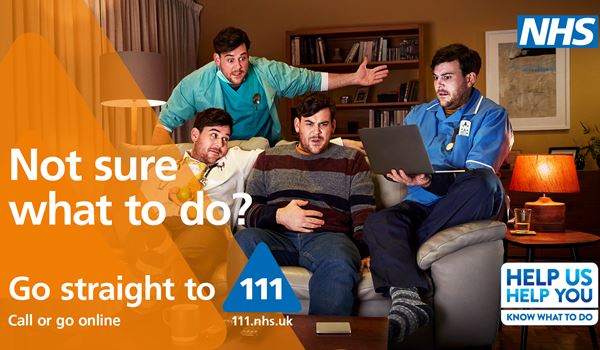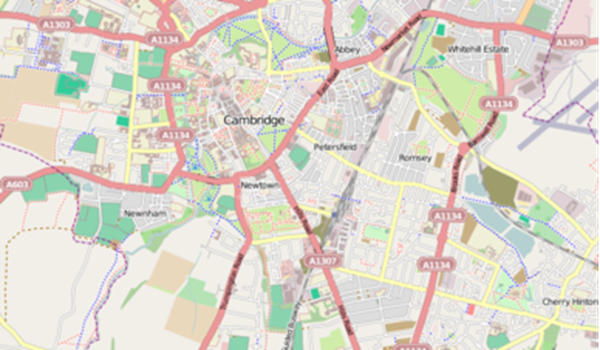Health Advice

What is an emergency?
General Practice is not an emergency service but we can manage urgent problems if we are open.
An emergency is a medical condition or symptom which requires immediate care as it is life-threatening or could result in serious injury/irreversible harm.
Call 999 or go to A&E now if you or someone has any of these:
-
signs of a heart attack (chest pain, pressure, heaviness, tightness or squeezing across the chest)
-
signs of a stroke (face dropping on one side, cannot hold both arms up, difficulty speaking)
-
sudden confusion or delirium (unsure of own name or age)
-
suicide attempt (by taking something or self-harming)
-
severe difficulty breathing (not being able to get words out, choking or gasping)
-
a serious accident, or severe injuries burns or scalds
-
heavy bleeding (spraying, pouring or enough to make a puddle)
-
severe injuries (after a serious accident or assault)
-
a seizure or fit (shaking, jerking, or unconscious & can’t be woken up)
-
sudden, rapid swelling (of the lips, mouth, throat or tongue)
When the Surgery is closed:
You should use the NHS 111 service if you need urgent medical help or advice for a physical issue that is not life-threatening. If you are experiencing a mental health crisis and need help call NHS 111 and select option 2 to speak to specially trained mental health staff who can discuss your mental health care needs.
You can also access NHS 111 online via www.111.nhs.uk (this service is for people aged 5 and over).
Mental Health and Wellbeing
If you require urgent care or are having a mental health crisis, please call NHS 111 Mental Health Option.
You can also click on the following link: https://www.cpft.nhs.uk/helpinacrisis/
Keep Your Head is a useful resource with lots of information. https://www.keep-your-head.com/
Domestic abuse can also have serious effects on your mental health. https://www.nationaldahelpline.org.uk/
Pharmacy First Scheme
Minor illnesses include conditions which will get better on their own, such as viral coughs, colds and rashes, as well as conditions which can be helped by remedies sold by your local pharmacy.
Your pharmacist may be help you for minor illnesses via the Pharmacy First Scheme.
Information on the Pharmacy First Scheme
They can treat:
- earache (aged 1 to 17 years)
- impetigo (aged 1 year and over)
- infected insect bites (aged 1 year and over)
- shingles (aged 18 years and over)
- sinusitis (aged 12 years and over)
- sore throat (aged 5 years and over)
- urinary tract infections or UTIs (women aged 16 to 64 years)
If you have any of the above please contact your local Pharmacist First.
Please see the comprehensive Health A to Z website for health advice:
Children and Young Adults
All babies and children get ill from time to time but it can be difficult to know when they are seriously unwell. Please see this link:https://www.nhs.uk/conditions/baby/health/is-your-baby-or-toddler-seriously-ill/
Here is a useful summary of common childhood illnesses and well-being:
https://www.cambscommunityservices.nhs.uk/advice/childhood-illnesses
Woodlands Surgery has links to the Cambridgeshire and Peterborough Health Visiting and School Nursing Service but you can contact them directly:
Children and Young Adults’ mental health is just as important as their physical health. Good mental health allows children and young people to develop resilience to cope with whatever life throws at them. Keep your Head is a useful website with information about local and national resources as well as advice.
Health and Wellbeing
According to WHO “Health is a state of complete physical, mental and social well-being and not merely the absence of disease or infirmity.”
At Woodlands Surgery we wish to promote lifestyle changes to enable our patients to feel healthy. Small changes are easier to make initially and then build on these.
There are 6 pillars of Healthy Lifestyle
Mental Wellbeing - See our pages about mental health and please speak to someone if you are struggling with your mood or anxiety.
https://www.keep-your-head.com/
Woodlands Surgery wish to promote:
- Supporting people to find purpose and meaning in life
- Encouraging people to access nature and the outdoors
- Using non-pharmaceutical, ‘positive psychology’ interventions such as gratitude practices, Cognitive Behavioural Therapy and Acceptance and Commitment Therapy
Minimising Harmful Substances
This includes watching alcohol intake, smoking, unhealthy foods, illicit drugs and pollution.
Healthy Relationships
Enjoying healthy and meaningful relationships and better social connection is essential for good mental and physical health.
We are hardwired to connect with each other; we are social beings and our family and community relationships give our lives purpose and meaning.
Some aspects of our modern lifestyles are acting to the detriment of our relationships and social connections. Whilst the internet and social media can in some instances bring people together, it can also have the opposite effect.
Local Resources
https://haycambridge.co.uk/activities/
Here at Woodlands Surgery with have a Social Prescriber, Care Coordinator and Mental Health Connector who can help our patients who are struggling with loneliness which is affecting their health. Please contact us for more details.
Healthy Eating
Having a poor diet is considered a significant risk factor for a range of chronic diseases.
Evidence shows that we should avoid ultra-processed food as much as possible( ie processed with additives and preservatives as well as high salt,fat and sugar content)
We should eat a diet full of fruit, vegetables, nuts, seeds and legumes.
Aim for low processed and high welfare meats and fish if eating meat.
We should opt for wholewheat and wholegrain foods where possible.
Sleep
Sleep is essential for giving our bodies and brains a rest and restoring energy levels. A regular sleep pattern helps us achieve the recommended 7-9 hours a night.
Physical Activity
We spend too much time sedentary at work, watching TV and driving. Any sort of exercise or physical activity is good for our health and wellbeing, with new evidence showing it can be as effective as medication for mild depression.
We should aim for at least 150 minutes of moderate exercise a week, spread over 4-5 days and include some strengthening exercises. we should alos avoid spending too much time sitting.
If you have a chronic condition your GP may be able to do an exercise on prescription.
https://www.cambridge.gov.uk/fitness-for-adults-with-long-term-medical-conditions
Physiotherapy
We are lucky to now have a First Contact Physiotherapist working with us. Chris Campany has appointments on Tuesdays, Thursdays and Fridays and can offer initial assessments, management advice or arrange further assessment, if required. He works closely with the rest of the Woodlands Clinical Team.
Alternatively you can self-refer to a physiotherapist via Dynamic Health:
Sexual health
While Woodlands Surgery can assess and give some advice for those with symptoms of sexually transmitted disease, we would usually direct you to specialist services for comprehensive testing and screening.
Locally iCASH is a confidential NHS service which offers screening and treatment for sexual health problems.
Carers
A carer is someone who provides support to an adult family member or friend who could not live independently, or whose health would deteriorate, without this help. Here is a link to the council website with useful resources and advice.
https://www.cambridgeshire.gov.uk/residents/adults/looking-after-someone
For parent carers:
https://send.cambridgeshire.gov.uk/kb5/cambridgeshire/directory/site.page?id=9n5eMfGl7nc
